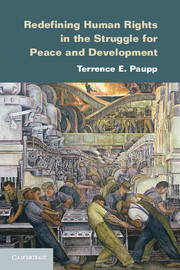Book contents
- Frontmatter
- Dedication
- Contents
- List of Tables
- Foreword
- Acknowledgments
- Introduction
- 1 The greatest undiagnosed problem in international law
- 2 From disparity to centrality: How the human rights to peace and development can be secured
- 3 Confronting structural injustice: Strategies of localization, regionalism, and an emerging global constitutional order
- 4 The power of law versus the law of power: How human rights can overcome inequality, poverty, and vested interests
- 5 A world community that includes all human communities: Indigenous communities and the global environment as sources for human rights claims
- 6 Actualizing the human right to peace: Paths for developing processes and creating conditions for peace
- Conclusion Transformation through cooperation: Implementing a human rights–based approach to human security
- Biography of Terrence E. Paupp
- Appendix 1 Principles Relating to the Status of National Institutions (The Paris Principles)
- Appendix 2 Tilburg Guiding Principles on World Bank, IMF, and Human Rights
- Appendix 3 Universal Declaration of the Rights of Peoples (Algiers, 4 July 1976)
- Appendix 4 The Freedom Charter (Africa, 1955)
- Index
- References
5 - A world community that includes all human communities: Indigenous communities and the global environment as sources for human rights claims
Published online by Cambridge University Press: 05 June 2014
- Frontmatter
- Dedication
- Contents
- List of Tables
- Foreword
- Acknowledgments
- Introduction
- 1 The greatest undiagnosed problem in international law
- 2 From disparity to centrality: How the human rights to peace and development can be secured
- 3 Confronting structural injustice: Strategies of localization, regionalism, and an emerging global constitutional order
- 4 The power of law versus the law of power: How human rights can overcome inequality, poverty, and vested interests
- 5 A world community that includes all human communities: Indigenous communities and the global environment as sources for human rights claims
- 6 Actualizing the human right to peace: Paths for developing processes and creating conditions for peace
- Conclusion Transformation through cooperation: Implementing a human rights–based approach to human security
- Biography of Terrence E. Paupp
- Appendix 1 Principles Relating to the Status of National Institutions (The Paris Principles)
- Appendix 2 Tilburg Guiding Principles on World Bank, IMF, and Human Rights
- Appendix 3 Universal Declaration of the Rights of Peoples (Algiers, 4 July 1976)
- Appendix 4 The Freedom Charter (Africa, 1955)
- Index
- References
Summary
Kant’s claim to have started a Copernican revolution in philosophy should . . . be taken in a very literal sense. His vision of a united mankind is a corollary of his geographical assumption of inhabitable continents being interconnected by fully navigable oceans. Most other theories of international order at this time were concerned exclusively with relations between European states, and they rarely bothered to discuss non-European communities other than as possible targets for conquest and exploitation by European powers. By contrast, Kant’s concept of a world community includes all human communities, irrespective of their degree of political and economic development, and regards them as indispensable parts of the same overarching community. The only boundaries morally relevant to such a community are those of the planet as whole, since “through the spherical shape of the planet they inhabit (globus terraqueus), nature has confined them all within an area of definite limits”
(Bartelson 2009, 155) (italics in original).Social and cultural movements that take educational work seriously are essential to the survival of humanity. Many alternative cultural projects and actions, both in and out of official schools, have achieved a particular convergence of energy that far surpasses their scarce resources and the limitations imposed by authorities. Their task is to re-create and socialize cultural diversity so that it might serve in the current struggles. The inclusion of many knowledges, cultural languages, and practices in these new educational spaces is a significant contribution to the creation of un mundo donde quepan muchos mundos – one world in which many worlds fit
(Rockwell 2010, 176) (italics in original).- Type
- Chapter
- Information
- Publisher: Cambridge University PressPrint publication year: 2014



